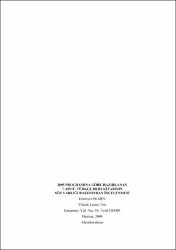2005 Programına Göre Hazırlanan 7. Sınıf Türkçe Ders Kitabının Söz Varlığı Bakımından İncelenmesi
Abstract
Türkçe eğitiminde temel hedef öğrencilere bilgi kazandırmaktan çok beceri kazandırmaktır. Bu beceriler anlama (okuma, dinleme), anlatma (konuşma, yazma) becerileridir. Kişinin bu iki temel dil becerisini kullanmadaki başarısı, sahip olduğu kişisel söz varlığına bağlıdır. Öğrencilerin söz varlıklarını geliştirmek için kullanılan en etkili materyal Türkçe ders kitaplarıdır. Ancak, 2005 Türkçe Dersi Öğretim Programı’nda her yaş grubuna ne kadar sözcük öğretileceği ile ilgili hedefler yoktur. Bu yüzden Türkçe ders kitabı hazırlanırken bu duruma dikkat edilmemektedir.
Bu çalışmada, 2005 Türkçe Dersi Öğretim Programı’na göre hazırlanan Millî Eğitim Bakanlığı Yayınları 7. sınıf Türkçe ders kitabında bulunan metinler söz varlığı bakımından incelenmiştir
Bu çalışma üç bölümden oluşmaktadır: Birinci bölümde, konuya açıklık kazandırmak amacıyla tezin kavramsal çerçevesi oluşturulmuştur. Bu amaçla, “dil, ana dili, sözcük, kavram, söz varlığı, Türkçe ders kitabı” gibi konu başlıkları açıklanmıştır. İkinci bölümde, kitaptaki bütün metinlerin ayrı ayrı sözcük listeleri oluşturulmuştur. Sözcük ve sözcük öbeklerinin kaçıncı anlamda kullanıldığı, özel isimler, deyimler, mecazlar, terimler, toplam kavram sayısı, yinelenen kavram sayısı, çeşit olarak kullanılan kavram sayısı ve oranları her metin için ayrı ayrı tablolar hâlinde gösterilmiştir. Üçüncü bölümde ise, elde edilen veriler doğrultusunda değerlendirmeler yapılmış; 7. sınıf Türkçe ders kitabının söz varlığı ortaya konmuştur. Main target of Turkish education is to bring skill in students rather than knowledge. These skills are comprehension (reading, listening), narration (speaking, writing) skills. Success of a person in using these two basic language skills depends on vocabulary. The most effective material to develop vocabulary of students is Turkish course books. However, in 2005 Turkish Teaching Program, there are no targets about how much words will be taught to the students of every age. Therefore, this matter is not taken into consideration while preparing Turkish course book.
In this study, the texts in 7th class Turkish course book published by Ministry of National Education prepared according to 2005 Turkish Teaching Program were evaluated in terms of vocabulary.
This study is composed of three parts: In the first part, conceptual framework of the thesis is determined to make the subject clear. To this end, the heads such as “language, native language, words, concept, vocabulary, Turkish course book” are explained. In the second part, respective vocabulary lists of all texts in the book are arranged. In which meaning the words and word groups are used, private names, idioms, metaphors, terms, total concept number, repeated concept number, number of concepts used a alternative and proportions thereof are shown in respective tables for each text. And in the third part, evaluations are made in accordance with the data obtained; vocabulary of 7th class Turkish course book is established.
Collections
- Yüksek Lisans Tezleri [2074]



















